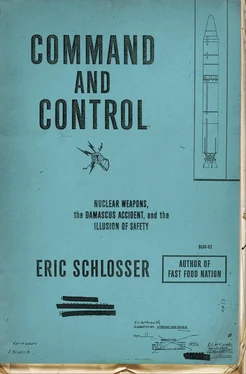Green was the noncommissioned officer in charge of training at the 308th. He taught MART teams everything they needed to know about the Titan II. The teams escorted warheads to and from launch sites, kept an eye on warheads as they were being mated to missiles, and responded whenever an alarm went off. Officers learned how to deal with antiwar protesters, saboteurs, and all sorts of false alarms. A bird flying past the tipsies could set them off, and then a two-man MART team would have to visit the site and investigate what had tripped them — because the complexes didn’t have security cameras topside. A missile crew had no way of knowing whether the tipsies had been set off by a squirrel or a squad of Soviet commandos. A MART team usually stayed overnight at a launch control center in each sector, using that “home complex” as a base to oversee security at three or four neighboring sites.
Four-seven often served as a home complex, and one of Sergeant Green’s teams had pointed out a major security breach there, just a few weeks before the accident. Green had been amazed by their discovery: you could break into a Titan II complex with just a credit card. Once the officers showed him how to do it, Green requested permission to stage a black hat operation at 4–7 — an unannounced demonstration of how someone could sneak into the launch control center undetected. SAC had a long history of black hatting to test the security at its facilities. Black hat teams would plant phony explosives on bombers, place metal spikes on runways, infiltrate a command post and then hand a letter to the base commander that said, “You’re dead.” General LeMay liked to run these tests and to punish officers who failed them. After Green received the go-ahead to stage a black hat at 4–7, his men secretly practiced the breakin.
On the day of the exercise, Green and two of his officers, Donald G. Mowles, Jr., and Larry Crowder, began the subterfuge by setting off the tipsies at Launch Complex 374-8 — about ten miles from Damascus, in the town of Little Texas. When the alarm sounded there, the MART team stationed at 4–7 got a call and drove off to see what was wrong. Green and his men hurried to Damascus, jumped the perimeter fence at 4–7, carefully avoided the radar beams that set off the tipsies, and entered the access portal. Green picked up the phone and told the missile crew commander that “General Wyatt” — a fictitious, high-ranking officer — needed to see a schematic drawing in one of the technical manuals. When the crew commander hesitated, Green demanded his name and warned him the general would be unhappy with that response. The commander said he’d look for the drawing right away.
Taking advantage of the distraction, Crowder and Mowles jimmied the lock on the outer steel door with an ID card, ran down the stairs, and within seconds jimmied the door at the entrapment area, too. The men ran past the only security camera at the launch complex. But the missile crew wasn’t looking at the television monitor — they were probably searching for that tech drawing — and the entrapment area didn’t have a microphone to capture the sounds of a breakin.
Green ran back to the perimeter fence, climbed over it, got into his truck, drove a safe distance from the launch complex, and parked.
Crowder and Mowles hid outside blast door 6, waiting. When the MART team returned from the false alarm at the other launch site, it was given permission to reenter 4–7. The team was buzzed through the first two doors and walked downstairs to blast door 6 — where it was surprised to hear a voice say, “You’re dead.”
One of Green’s men picked up the phone there and said, “Security team at blast door six.”
The door was opened, as were blast doors 7 and 8. Crowder and Mowles walked into the control center, feeling awfully pleased.
Steel plates were soon welded to the outer doors at Titan II sites so that intruders would need more than a credit card.
• • •
THE DRIVE TO DAMASCUS SEEMED to be taking forever, as the PTS convoy picked up equipment at two launch complexes, made three stops, and obeyed the speed limit.
“I’ve got a bad feeling about this,” Senior Airman David Livingston said. “Somebody’s going to die out there tonight.”
The other members of Team B didn’t like hearing Livingston talk that way. He wasn’t a fearful or high-strung type. He was one of the most easygoing, laid-back guys at the base. If anything, Livingston was too laid back. He’d become legendary for his ability to sleep just about anywhere, anytime — and once he was out, it was almost impossible to wake him. Jeff Kennedy would sometimes have to bang on Livingston’s door in the morning and yell at him and literally drag him out of bed. But nobody really minded, because once he was awake and alert, Livingston worked hard. He knew how to fix things. He was constantly tinkering with mechanical objects in his spare time — with citizens band radios, lawn mower engines, transmissions, and the old VW Beetle that he’d bought a few years earlier, right after graduating from high school. He loved to ride motorcycles and could pop a wheelie, lean back in the seat, and cruise.
During the previous summer, Livingston had visited his family in Heath, Ohio, a small town surrounded by cornfields in the central part of the state, where his father drove a truck and his mother worked as a clerk at a nearby Air Force base. He’d ridden his motorcycle there and back for a long weekend, a round trip of about fifteen hundred miles. He lived off base in a double-wide trailer, planned to ask his landlord’s niece to marry him, and couldn’t decide whether to move with her to California or sign on for another four years with SAC. The hardest part about leaving the Air Force, Livingston thought, would be saying good-bye to his loud, rowdy PTS buddies. They felt like family.
Senior Airman Greg Devlin was riding next to Livingston in the truck. At first he thought Livingston was joking about the bad vibes and the premonition of death. But it wasn’t funny. And then Livingston said it again.
“Somebody’s going to die tonight, I can feel it.”
“Don’t even be kidding around with stuff like that,” Devlin said. “Don’t even be talking about that.”
Devlin wasn’t very superstitious. He just didn’t like to dwell on bad things. The job was full of risks, and if something dangerous had to be done, his attitude was: okay, let’s go do it. There was no use talking about it or thinking about it too much. He was the type of person who instinctively ran toward a fire, not from it. And he didn’t like to waste time worrying about it first.
Devlin, like Livingston, had grown up in Ohio, graduated from high school in 1977, and joined the Air Force that year. Devlin had to miss his high school graduation; it was held the day after he reported for duty. During basic training, he was seventeen years old. His father and his uncles had been Marines, but Devlin was drawn to the Air Force. He wanted to become a pilot or an airplane mechanic. The Air Force decided, instead, that he would become a Titan II propellant transfer system technician. At training school, he desperately missed his high school sweetheart, Annette Buchanan. With her mother’s blessing, they soon got married, and Annette joined him in Arkansas. She was sixteen. The newlyweds started out in a small trailer and then made a down payment on their first house, when Devlin turned nineteen. The house was in Jacksonville, not far from Little Rock Air Force Base. His friends didn’t like to throw parties in the dormitories, because they always had to worry about the dorm monitors and the dorm guards. And so almost every weekend, the parties were held at Devlin’s house. A fair amount of alcohol was consumed. And if a party got a little out of hand, Devlin knew how to deal with it. He was friendly, courteous, even tempered — and a Golden Gloves boxer, just like his father, his uncles, and one of his grandfathers had been. Devlin trained at a local gym. He fought as a junior middleweight and had recently scored five straight knockouts. When he asked people to quiet down at a party, they generally did.
Читать дальше












